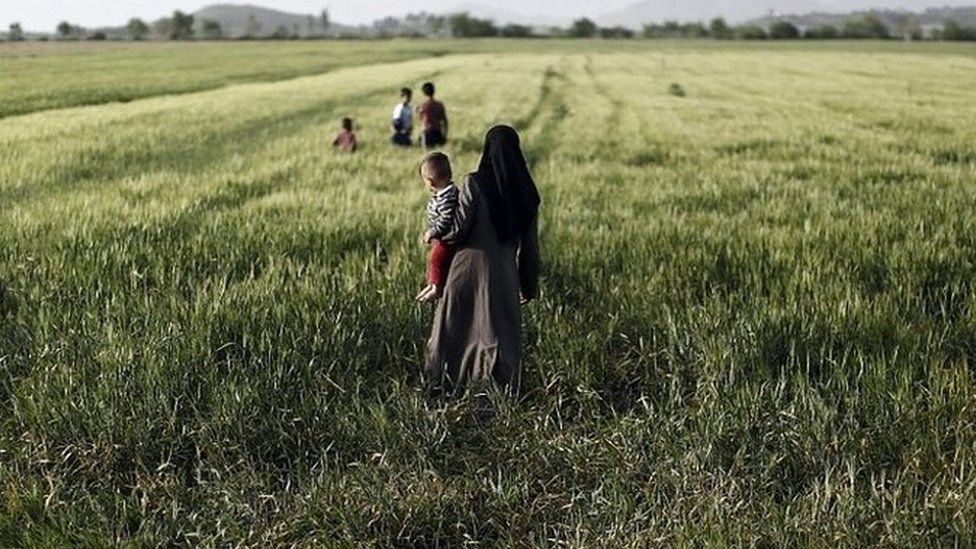UK to take thousands of child refugees
- Published

The UK will take in up to 3,000 refugees, mostly vulnerable children at risk following conflict, from the Middle East and North Africa by 2020.
The government called the move the "largest resettlement programme for children in the world".
It is in addition to the pledge to take 20,000 refugees by 2020.
But critics said it would do nothing to help the thousands of lone refugee children who had made it to Europe, but were at risk of trafficking and abuse.
The government scheme will target unaccompanied children in the Middle East and North Africa, as well as those considered at risk of abuse and exploitation, such as children threatened with child labour and child marriage. It will resettle children and their families "where the UNHCR deems resettlement is in the best interests of the child."
'Exceptional circumstances'
Several hundred people are expected to be resettled in the UK by April 2017 "with a view to resettling up to 3,000 over the lifetime of this Parliament", the government said.
The five-year Syrian civil war has created more than 4.5 million refugees across the region - half of them children in need of food, education and a home. The UN has warned that a whole generation of Syrian children is at risk.
Immigration Minister James Brokenshire said: "We have always been clear that the vast majority of vulnerable children are better off remaining in host countries in the region so they can be reunited with surviving family members. However, there are exceptional circumstances in which it is in a child's best interests to be resettled in the UK.
"We have engaged with a number of NGOs, including the UNHCR on the best way to provide protection to refugee children and ensure their welfare and safety remain at the heart of every decision made."
The scheme will be reviewed after two years.
The announcement was welcomed by Children's Commissioner for England Anne Longfield, who said the children would get the "vital protection and support they need" in the UK.
But Yvette Cooper, chairwoman of Labour's Refugee Taskforce, said the announcement included "nothing new to help the thousands of child refugees alone in Europe who are at risk of trafficking, sexual exploitation and abuse".
"Children are risking their lives every day making dangerous journeys, and Europol estimate at least 10,000 children have disappeared in the crisis, many trafficked into prostitution and modern slavery. Many children are sleeping rough or in makeshift camps because children's homes are full, and many have been sexually abused and exploited too."
'Cynical ploy'
And Lib Dem leader Tim Farron suggested that the move was a "cynical" ploy - a bid to "buy off" Conservative backbenchers ahead of a Commons vote on the issue of unaccompanied children in the camps next week.
He told the BBC the announcement would not help the 30,000 unaccompanied children who have made it to Europe already but are at risks in camps: "Of those 30,000, 10,000 have gone missing. David Cameron has the ability, should he wish to do so, to step in and prevent these children who are go missing into the hands of child sexual exploiters, human traffickers... And yet once again he's failed to take the opportunity."
And Labour's Lord Dubs, who moved the amendment to the Immigration Bill calling on the government to take in 3,000 child refugees already in Europe, said: "While I welcome this proposal, it doesn't deal sufficiently with the substance of my amendment."
"You also have to wonder whether the use of the 3,000 figure is a deliberate ploy to muddy the debate."
The government has already committed to resettle another 20,000 Syrian refugees under the Vulnerable Persons Resettlement Scheme, 1,000 of whom have already arrived, including more than 500 children.
Correction 5 May 2016: This story has been amended to make clear the refugees will come from the Middle East and North Africa and not just the Syria region.
- Published9 April 2016
- Published13 March 2016
- Published15 March 2016